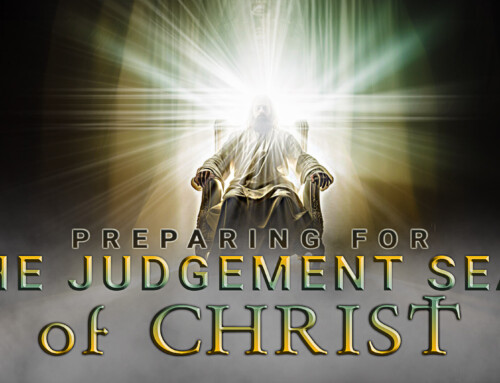(The Greater Accountability of New Covenant Believers)
The second chapter begins with the first of 5 great warnings in the Book of Hebrews: “Therefore we ought to give the more earnest heed to the things which we have heard, lest at any time we should let them slip (or drift past them).” This holding on to shows that the warning is to continue in the Gospel message that they had heard: 1) the Gift of eternal life at the moment of faith that they had already received which is to continue in the HOPE of something already set before them as believers in the Son. 2) the hope of eternal glory in the heavenly calling, which is a reward, is subject to loss through faithlessness or neglect. The possibility of losing the hope of eternal glory and to reign with Him as His “…fellows…” (1:9) is in view. By their own negligence they could certainly be in danger of losing that for which they should hope for; the fullness of the Son’s Salvation Atonement. This is shadowed in the Israelites’ loss after their deliverance from Egypt ( See 1st Corinthians 10 where it speaks of them being examples to us). For all were brought out but only two prevailed in entering in to the calling to be set apart in a kingdom of kings and priests in the promised land.
VERSE 2 & 3 “For if the word spoken by angels was steadfast, and every transgression and disobedience received just recompense of reward; How shall we escape, if we neglect so great a salvation.…” So this great salvation is not saying, “How will you escape eternal perdition?” But it refers back to joint heirship with the Son in the last verse of chapter one.… “…who shall be heirs of salvation.” That is to say the Son’s full salvation compared to Israel’s is far superior than that of Moses’ salvation, in that He, being a greater Savior, and His salvation holds forth the greater reward of the First Resurrection in partaking in the glorious heavenly Kingdom of the Millennial reign of the Son and fellows (Revelation 20:4-6) as the ‘New Man’. Reigning in the power of that which was foreshadowed by the Holy Spirit in signs and wondrous miracles, and the casting out of satan and his demons, which is representative of that future greater salvation coming. That Kingdom’s greater salvation promise to come that could be lost by negligence is that which the entire Book of Hebrews was constructed around, and that which Paul put all his energies into to obtain… “I press toward the mark (goal) for the prize (first resurrection) of the high calling of God in Christ Jesus.” [Philippians 3:14]
The multiple warnings being: if the Old Covenant being inferior carried the weight of just retribution for offenses, how shall we escape, if we neglect so great a salvation? This is not a warning word to the ungodly who refuse to accept pardon for sin inherited from Adam, but to those who are “saved” from the condemning Curse and Wrath. To those who are sure to be set before the Judgment Seat of Jesus Christ; where He will assume the role of Judge of His people and reward those worthy of inheritance and punish without respect or regard to person for wrong which they have done (Hebrews 10:30, Colossians 3:23-25). It is this reward of greater salvation or loss of Kingdom inheritance that the Holy Spirit holds forth throughout the Book of Hebrews.
The understanding of the Gift and the Prize is the key to curing any theological difficulties within the Book. The drifting past is not heeding what we heard, just as sailors who are asleep at the oars drift past the sanctuary of the heavenly port. Unlike the gracious Gift of eternal life (see Romans 6:23), it requires effort to secure this great Salvation reward. Thus the examples Paul presents the Christian, one being….“let us run the race that is set before us” with a crown in view (1st Corinthians 9:24-10:15). 1st Corinthians 10 gives us the severe reality by the comparing of redeemed Israel with the redeemed by Christ in that “…every transgression and disobedience received just recompense of reward…” Which lays out the position of every Christian while they are alive on this earth plainly enough. As soon as the redeemed Israelites arrived at Sinai, commands of instructions with penalties were given. After Redemption/Deliverance, then came Instruction. And so the Christian delivered from the kingdom of darkness, is now instructed by Jesus Christ (our Greater Deliverer) with commands carrying penalties of sure loss of the Kingdom inheritance and in some cases more or less severe chastisement (Luke 12:47–48). The seriousness of those Commands are taken too lightly by Christians. They are being deceived or misguided by religious false leaders and teachers having received the lie of an all encompassing Gospel of “Grace”. A Grace where it is taught that Christ’s Righteousness is imputed to them both as it relates to justification and sanctification unconditionally. Thus Christians don’t believe “in the hope of their calling” and pay little or no attention to Christ’s qualifying commandments with exhortations unto worthiness based upon our personal works of righteousness in service to Him. Let us reflect and judge for ourselves the meaning of these Scriptures:
“Go ye therefore and make disciples….teaching them to observe all things whatsoever I have commanded you”. “If you love Me, keep My commandments”. “He that hath my commandments and keepeth them, he it is that loveth Me.” “If ye keep my commandments, ye shall abide in my love; even as I kept My Fathers commandments, and abide in His love.”
Christians who “drift” are in unbelief (they are believers in Christ as their Savior but in apathy, carelessness, self-absorbed, indolence) and shall not receive the great salvation of Kingdom glory. (They have the gift of eternal life but NOT the reward of eternal glory.)
“Verily I say unto you, Whosoever shall not receive the kingdom of God as a little child, he shall not enter therein”. “Now I praise you, brethren, that ye remember Me in all things, and keep the ordinances, as I delivered them to you”.
To Christians, He says : “Not every one that saith unto Me, Lord, Lord, shall enter into the kingdom of heavens, but he that doeth the will of My Father which is in heaven.” The Kingdom of heavens then must be something distinct from eternal life, which has no such requirements attached (Romans 6:23, Ephesians 2:8). Jesus rarely spoke of eternal life, but just in the Book of Matthew, “the kingdom” is said or referred to over 50 times. Heeding and not slipping past the great salvation is keeping the Commandments of Christ without which we are subject to be excluded. That is to say that exclusion from the Kingdom salvation is to miss the First Resurrection out from among the dead at Christ’s 2nd Coming and remain among the dead until the 2nd resurrection. Many Christians receive Christ as Savior but tragically know Him not as their Lord. His commands are not taken seriously as a result of false religious reasonings, such as those stated above along with others like one that says, If He were to judge none could stand.’ It is true that no one will be brought into judgment before Christ for trial of justification unto eternal life, for if he has accepted Jesus Christ as Savior it is his by gift. But the Lord and His Apostles declare all saved to be servants, and shall give account to Him for their service since they believed, to be rewarded or punished, according to their works or deeds.
Thus the New Testament warnings of the Book of Hebrews concern the exclusion from the greater salvation in the kingdom to Christians for transgressing the Commandments of Jesus Christ found throughout the New Testament. (such as His direct statements in Matthew chapters 5-7, and the Epistles: 1st Corinthians 5:9–10, Galatians 5:19-21, Ephesians 5:5-7. The same doctrine of faithful obedience to Him is the subject of some of the Lord’s parables, such as the Unmerciful Servant, the Steward, the Talents, and the Pounds. Here in Hebrews, Jesus Christ is portrayed as the Son gloriously raised to the right hand of the Father as High Priest. And He is represented in the parable types as the returning King.
“For the kingdom of heavens is as a man traveling into a far country, who called his own servants, and delivered unto them his goods…..After a long time the Lord of those servants cometh, and reckoneth with them.” ( see Matthew 25:14-30, Luke 19:12-27)
It is Jesus, the Lord, to Whom we shall directly answer and be rewarded or punished at His Judgment Seat (Romans 14, 2nd Corinthians 5). Hebrews 2 declares that if the offenses of the Old Covenant participants brought punishment and loss of good things to the offenders, so neglecting to obey the commandments of Jesus Christ, the greater Messenger with the greater message of New Covenant, Who will surely Judge its participants, shall also bring His displeasure in judgment upon His unfaithful servants. This judgement being the very real possibility of exclusion from His Kingdom, and the very real warnings of positive infliction of punishment until every farthing of service ignored during this life is extracted unto a declared wholeness or holiness (Matthew 18:34–35; 5:21-37).
So it is that the Book of Hebrews, here in the 2nd chapter and throughout, testifies against the Modern Day preachers of “Grace” only. It is not: ‘God’s threatenings are bound to the Old Covenant, as we stand in His Grace’. But on the contrary: If God’s judgments were exercised against Old Covenant offenders, much more shall His judgment chastisements strike those who critically judge His Grace extended in His Son’s Atonement!




Leave A Comment